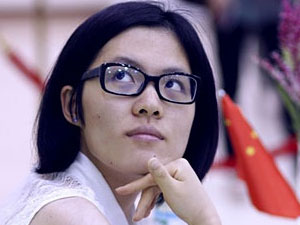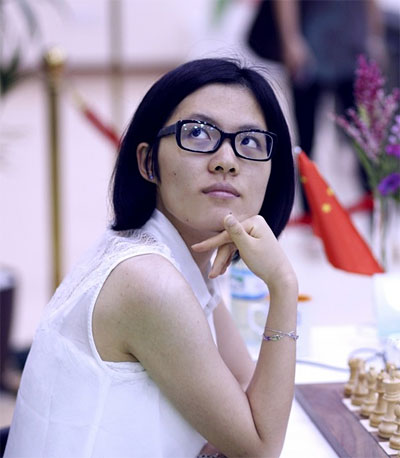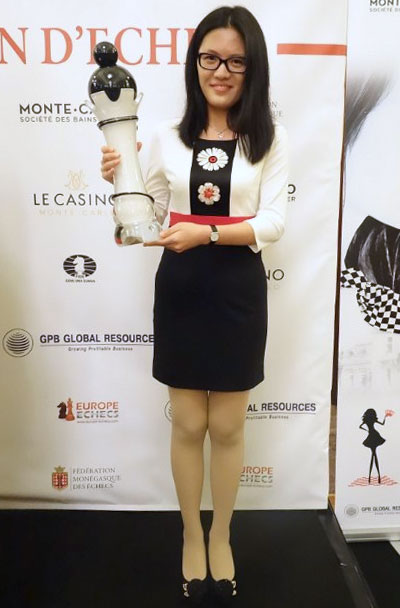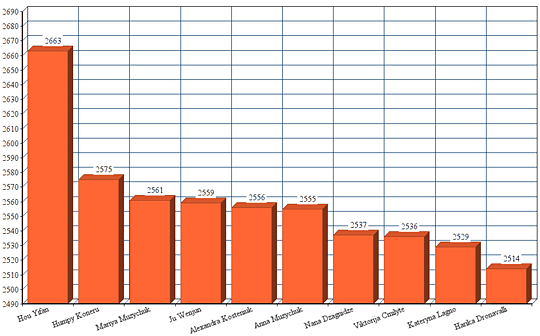



Frederic Friedel: Hello Yifan, can we talk?
Hou Yifan: Hi Frederic, sure. But give me a minute – I’m in a library and will find a quiet spot.
FF: A library? But isn’t that the quietest of places?
HY: Not this one. But now I am in a quiet room and we can speak.
FF: So how are you in general? What are you up to?
HY: I’m busy with my graduation thesis and a presentation for an award of my University. Later this month, I will play Shamkir. And how are you doing? How is your knee?
FF: [had an accident and badly injured his knee – gives Yifan a brief medical rundown] But now to the questions that is burning on my mind: you have dropped out of the FIDE Women’s Grand Prix 2105/16 circuit. Actually, you played in the first leg in Monaco, and won it by two full points. The second event in Tehran was won by Chinese GM Ju Wenjun by half a point, and the third in Batumi by Russian GM Valentina Gunina – in both these events you did not play. Normally you would now be tied with these two at 160 points. But the current WGP standings have left you out.

Hou Yifan won the Monaco Women's Grand Prix last October by two full points,
earned 160 Grand Prix points and €10,000 in prize money
HY: I decided to drop out from WGP cycle after I received an unclear answer from FIDE regarding the possibility of a change in the current Women’s World Championship system. I participated in all previous cycles, since 2009, and the main reason in recent years was that the overall winner got the right to play the Women’s World Championship match. I didn’t think this was actually reasonable, but it was the only option I had. Now the situation is different. I do not see any point in taking part in the different stages only to be able to play in the WWCC, especially when the opponents usually are at least one hundred points below me. For years now I have expressed my deep dissatisfaction to FIDE about this, but they didn’t accept anything I said. So I won’t consider staying in a system with which I completely disagree.
FF: Will you be playing in the knockout Women’s World Championship, which is scheduled for later this year?
HY: No, I won’t even think about it. I can’t agree with the current system. I would like to mention that since the previous WWCCh Match was postponed to this year, the knockout tournament should be held at least one year later. I mentioned this to FIDE, last year before I signed the contract of the Lviv Match, and the reply was that they had received my request and “would discuss it at the next board meeting”— same answer as always. Okay, back to your question: already in 2012 I hesitated with my participation. I had won the match against Humpy in Tirana, and then reluctantly played in the knockout world championship in Khanty Mansiysk, Russia, with a very unsatisfying result. Then the knock-out tournament in 2015, which was supposed to be held on late 2014, clashed with the Hawaii Chess Festival. This time I had no choice as I promised to play in Hawaii before FIDE announced the new dates of the event.
FF: You clearly don’t like playing in the knockout world championship…
HY: I’m flexible with any formats of chess events. The thing I can’t agree with is that such a knock-out tournament will decide who is the World Champion. A 64-player knockout event is mostly a lottery: you play two games, and if you lose the first for some reason you have good chances to be eliminated. It is something that can happen in any of the five rounds required to reach the final. I was lucky in 2010 in Turkey, but in Khanty-Mansiysk I was knocked out by Monika Socko in round two. In the same round the other top seeds Humpy Koneru and Anna Muzychuk were also eliminated, all three of us by players rated 150 points lower. The winners of previous knockout world championships have been Xu Yuhua, Alexandra Kosteniuk, Hou Yifan, Anna Ushenina, Mariya Muzichuk – strong players, but in some cases not close to the strongest in the world.
| Year | Type | Won by (report link) | Venue |
| 2004 | 64-player knockout | Antoaneta Stefanova | Elista, Russia |
| 2006 | 64-player knockout | Xu Yuhua | Ekaterinburg, Russia |
| 2008 | 64-player knockout | Alexandra Kosteniuk | Nalchik, Russia |
| 2010 | 64-player knockout | Hou Yifan | Hatay, Turkey |
| 2011 | ten-game match | Hou Yifan | Tirana, Albania |
| 2012 | 64-player knockout | Anna Ushenina | Khanty Mansiysk, Russia |
| 2013 | ten-game match | Hou Yifan | Taizhou, China |
| 2015 | 64-player knockout | Mariya Musichuk | Sochi, Russia |
| 2016 | ten-game match | Hou Yifan | Lviv, Ukraine |
FIDE had a similar system for the Men’s World Championship in the past, with 128 players starting a knockout tournament. But this was abandoned since similarly the title was won by players who were not in the top ten or twenty in the world.
FF: If you do not play in the next 64-player knockout event we will have a new Women’s World Champion, and you will not be able to challenge her in 2017, since you have left the Grand Prix cycle that selects the challenger. You will lose your title without playing a match, and would also be out of the WWCC cycle for the near future.
HY: That’s true according to the current Women’s system, and that is why this is the right moment to improve the system. I’m not proposing this after my first title win – I’ve been doing it for six years now. Apart from the previous reasons I have given, the general point is that the overall system is not logical: the winner of the knockout tournament will be called “World Champion” and the previous World Champion loses her title. By the way: what happens if I played the knockout and won it? Would I challenge myself? No, the challenger will be the runner-up of WGP. My match with Humpy was because she’s finished second in the WGP cycle at that time – I had 465 points and she had 380. Anyway, I have showed my performance in the different tournament formats, including knockout, closed tournaments and matches, for the past six years, and now is the time to make a change. I have had this idea for a long time, but until now I kept thinking to myself “you are not strong enough to ask for changing the system”, and “probably FIDE will seriously consider it if you win more events”. These and similar thoughts encouraged me to continue playing in the World Championship cycle, but after winning three matches, and with FIDE still rejecting all my proposals, I did not see any point to continue playing in an illogical and unfair system.
FF: How exactly would you like the system to be modified?
HY: Basically it should be held like the men’s World Championship: qualification tournaments, a Candidates tournament, and the winner plays the reigning World Champion. This is the way the World Championship was handled for most of chess history. However, if FIDE says it is too complicated or too difficult to find sponsors, I have a very simple solution: keep the current system, exactly as it is, or even extend it, as in the men’s Grand Prix, so that more women players can participate. But there should be one important difference: the lucky winner, at the end of the cycle, is not the new Women’s World Champion but the Challenger. She gets the right to play the reigning Women’s World Champion in a ten-game match.
FF: So a full WWCCh match every two years instead of every year?
HY: Yes, of course. Having one every year – or in fact two Women’s World Championships in a single year, as is theoretically possible in 2016 – reduces the value of the title. Magnus is the perfect example: he is the strongest player (by far) in the world, and has won two World Championship matches against a qualifier who was picked by Grand Prix, World Cup tournaments and Candidates. Last month Sergey Karjakin was the lucky winner of the 2016 qualification cycle. He became the third Challenger and gets to play a 16-game match against Magnus in November. Why can’t we have a similar system for women?
FF: Sounds perfectly logical. However FIDE has said that the current Women’s system is very popular amongst the girls since they get to play a lot of interesting events …
HY: Yes, but that would stay exactly the same, except that the lucky winner doesn’t get the highest title in women’s chess, but only the right to challenge the current title holder for it.
FF: What does FIDE say about your proposals?
HY: They keep promising to consider my requests, to discuss them at Presidential Board meetings and talk with the other women players. They will try to figure out a solution later on. That has been going on for three or four years now. So I have decided to exit the WGP and wait to see if it will be reformed.
FF: FIDE says that it is impossible to get funding for the knock-out event, which the other women love, if it is not a world championship but only produces a challenger…
HY: Yes, of course you can make any tournament more interesting by making it a world championship. Just imagine if Wijk aan Zee, St Louis or Norway Chess would produce world champions and the reigning World Champion would automatically lose his title. Naturally the organisers and the players might love it, but it would very much reduce the value of the title.
FF: Yifan, if you drop out of the women’s cycle you could become a kind of Judit Polgar: you would be the strongest female on the planet, a hundred points ahead of everyone else, but only playing in men’s tournaments?

Top ten in women's chess today – click to enlarge
HY: Well, not exactly. Of course Judit represents a great example for women’s chess to encourage girls to play, but I am looking forward to making my own way. If the system could be improved in a reasonable way I think I would not entirely quit women’s chess, at least not right now. But as long as the winner of the World Championship match automatically loses her title, without a match, I unfortunately have no other choice than to stop participating in the cycle. However, thinking positively, this may not be that bad. It would allow me to focus on the top level, on the “men’s” field. I could try to become stronger, to be more efficient, as there would be no obligation to play the women’s tournaments anymore.
FF: A final question: if FIDE accepts your proposal, if they agree to make the winner of the knockout tournament the Challenger and not the World Champion, would you be willing to re-join the cycle? Would you defend your title against the Challenger in 2017?
HY: Of course. Please remember that I did not quit the whole system, I only withdrew from WGP cycle. If the winner of the next knockout championship will only be the Challenger, then I will continue my participation for sure. The logic is like this: if FIDE keeps the current world championship system I will drop out from it all together. But right now I have the World Championship title and am willing to defend it in a match against any Challenger.